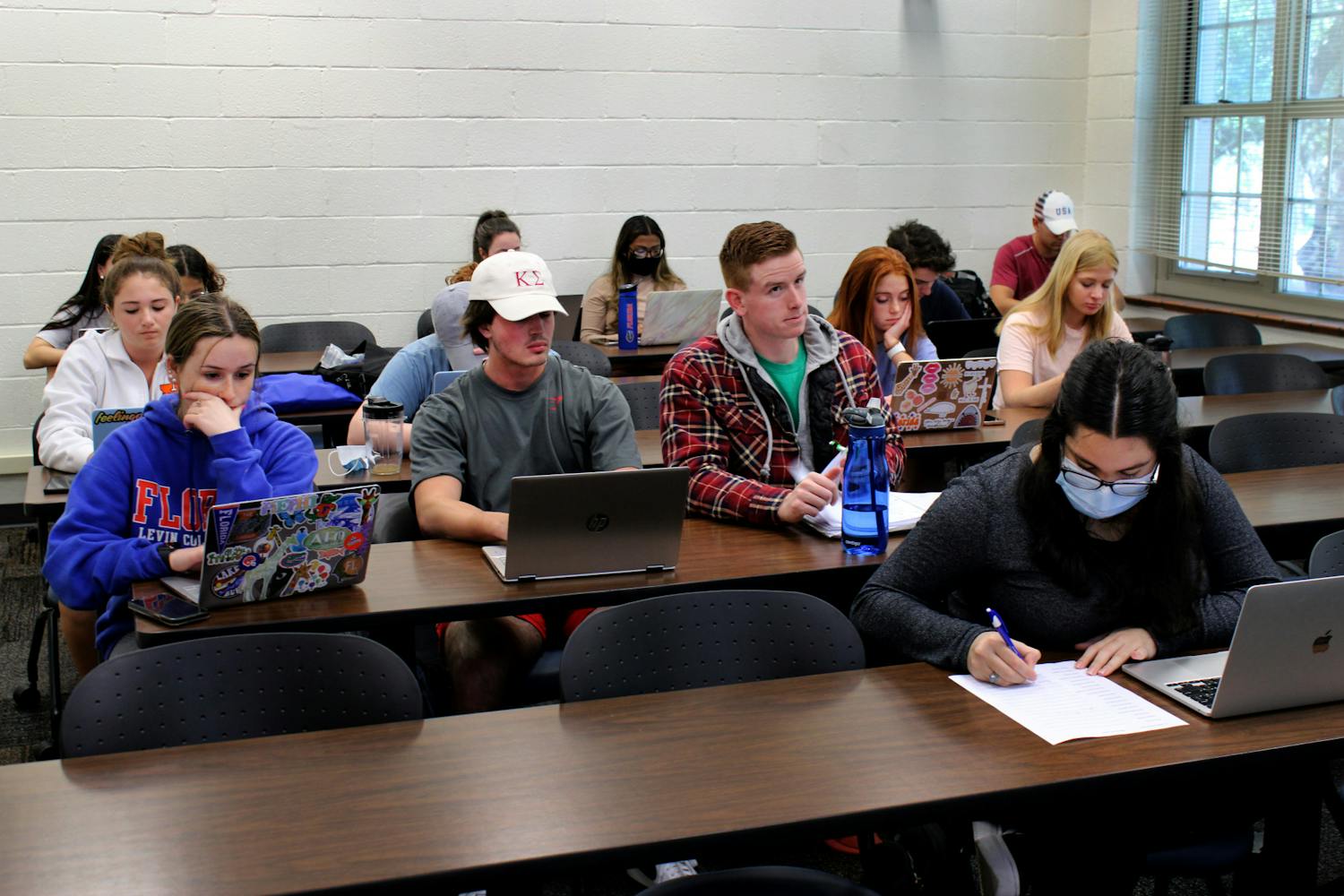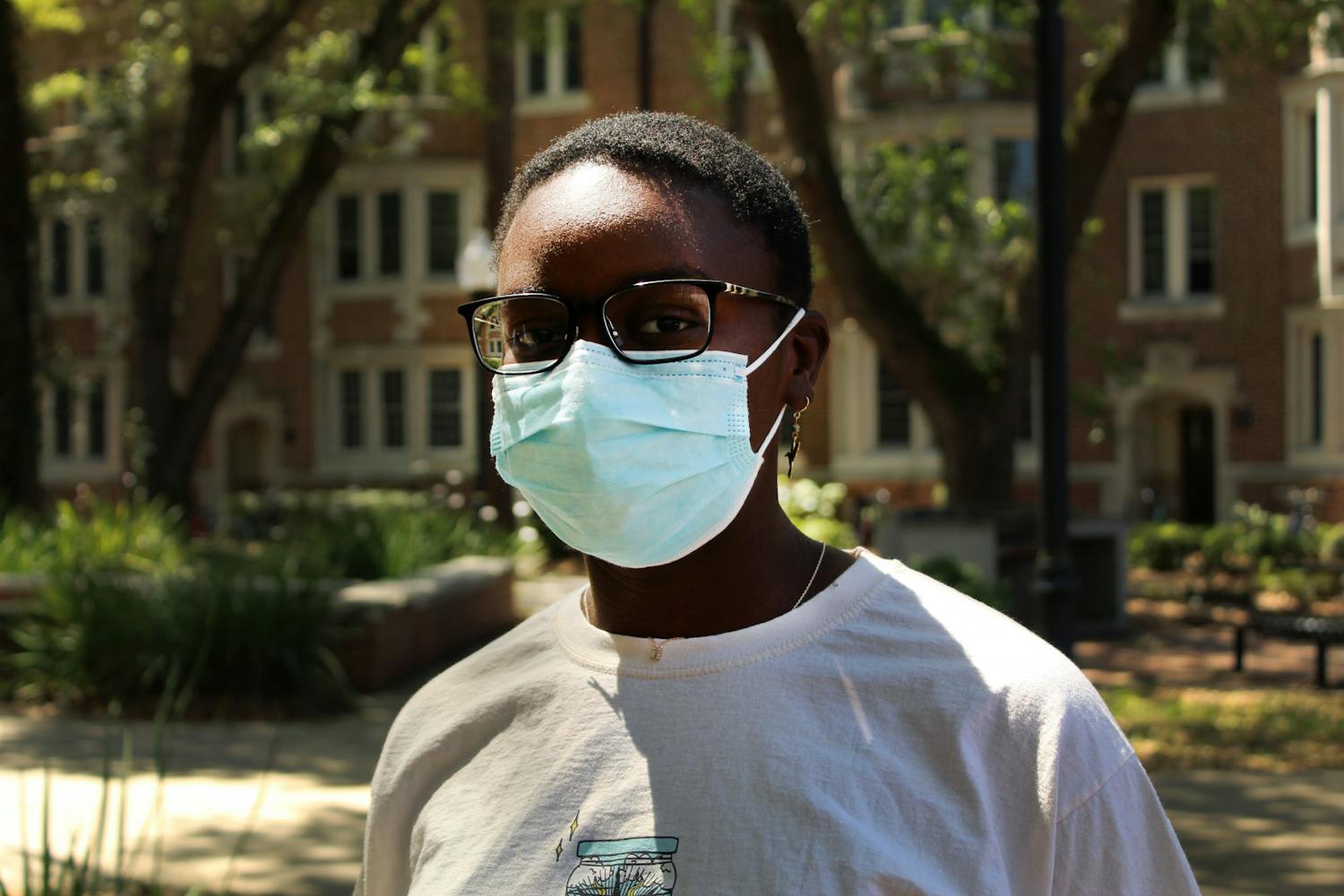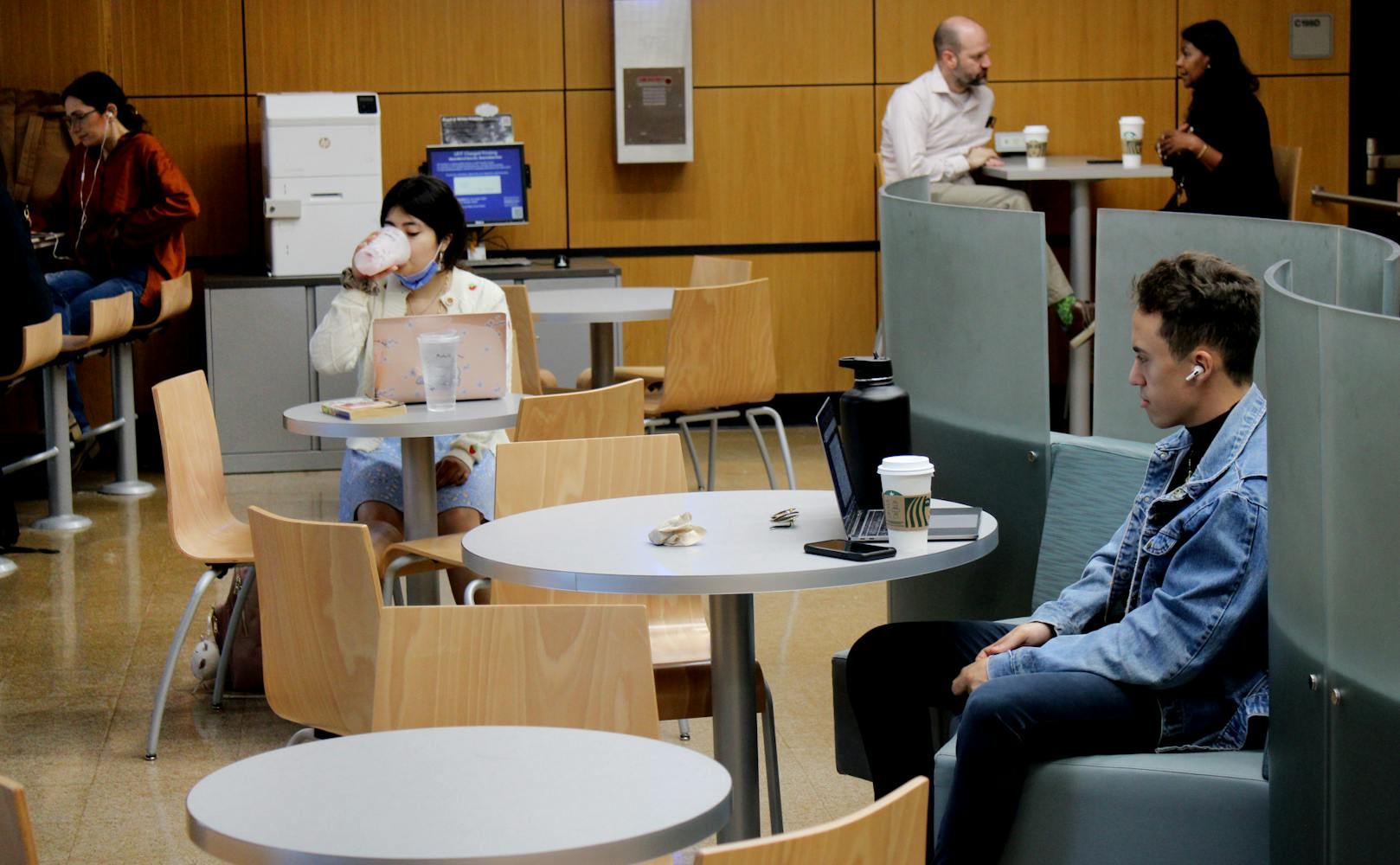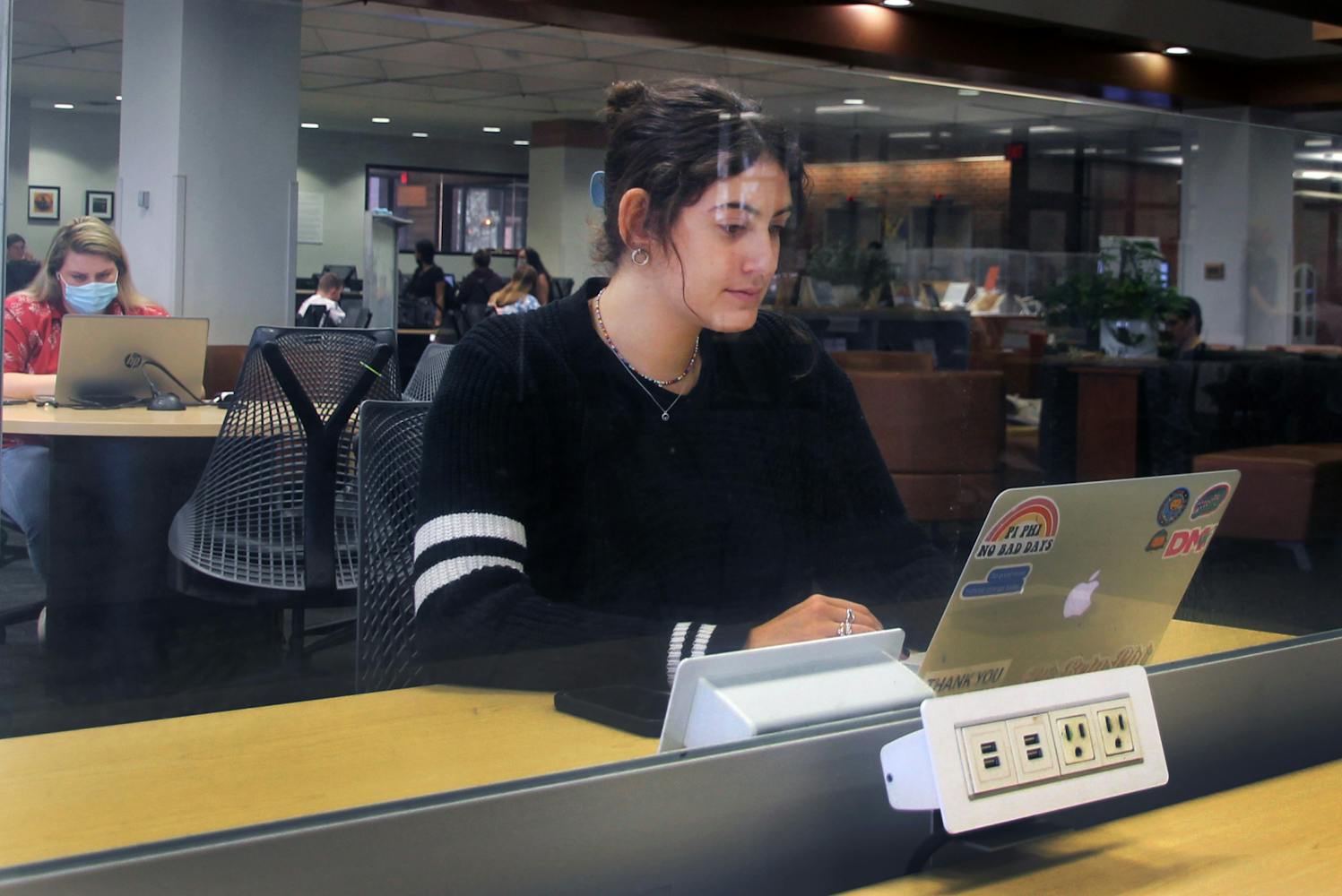Each time the Century Tower bell marks the next period, students enter classrooms wondering if they should don or ditch a mask.
Since Wednesday, UF no longer recommends or expects students to wear masks but welcomes them to mask if they choose to. UF released new masking guidance due to a decline in local and nationwide COVID-19 case numbers.
While some dropped their masks the day after the revisions, others stayed cautious. Large lecture halls have a pattern of bare faces intermixed with only eyes peeking out from above masks.
The CDC released updated pandemic guidance in February. The new guidelines advised people in counties with low or medium COVID-19 hospitalizations that they no longer needed to wear masks.
Six days before UF changed the masking policy, Alachua County’s CDC status was updated to medium community level. A county’s level is determined by new COVID-19 admissions, the percentage of hospital beds occupied by COVID-19 patients and the total new COVID-19 cases per 100,000 population in the last seven days.
Despite dropping positivity and new policies, many UF classrooms have generally maintained the same appearance.
Steve Noll, UF history professor, hasn’t noticed a difference in his classes so far. Most of his students still choose to wear masks, though he expects more maskless students soon.
“The biggest difference is UF had to print off all new signs and take down the old ones and put them up,” he said.
As Florida trended better with the pandemic, Noll assumed mask mandates would change. He said it’s an appropriate time to move in this direction, but thought the university should have released a statement thanking people for masking this long.
“I just think there should have been something in there about thanking those people who were masked for helping keep numbers down,” he said.
His only goal throughout the pandemic has been to keep his students safe, so he will still offer classes via Zoom and thanks any students who continue to mask.
While classrooms have been split with masked and unmasked students for months, some are inclined to continue with precautions.
Olivia Steinman, a UF health science sophomore, is fully vaccinated and continues to wear a mask.
The 19-year-old volunteers at UF Health Shands Children's Hospital. Every Tuesday, she cuddles and comforts premature babies in the neonatal intensive care unit. On Wednesdays, she volunteers in the pediatrics unit and plays with hospitalized children, ensuring their stay at Shands is less frightening.
For now, masks are required in UF health care centers and hospitals, according to the Wednesday campus brief.
“I have a responsibility as a volunteer at Shands, and I see a different side of things through volunteering where these kids are really sick,” Steinman said. “There's definitely a reason for me to keep myself healthy because I know what I'm doing is important for them.”
She keeps these children in mind when she masks up in class and outside UF.
Some students, however, are relieved masks are no longer recommended in their extracurriculars.
Ashley Blum, a 19-year-old UF acting sophomore, has been required to wear a mask during performances.
On Wednesday, following the new mask guidelines, her classmates performing in the major’s current production, “Stupid F-----g Bird,” unanimously voted to perform without masks.
“As an acting major whose performance is very much dependent on our facial expressions, it was very emotional and exciting in class today to see people perform without a mask on their face,” Blum said. “I feel like our education will strengthen so much.”
Before the new guidelines were in place, the students in all the stage productions required wearing a mask while performing.
Acting students choose to wear masks in class and while watching performances, only taking them off when they are onstage, Blum said.
Other students feel the need to continue wearing a mask for their own protection.
Tanvi Mathews, a 20-year-old UF information systems sophomore, urges people to continue to keep themselves and others safe from COVID-19, despite the relaxed mask guidelines.
“I think that where we’re headed as a country and as a whole, we’re getting to herd immunity,” Mathews said. “We’re getting there, but we need to make sure that we’re maintaining social distancing at least in crowded areas like buses or classrooms.”
To reach herd immunity, 80% to 90% of a population are required to have had infection of COVID-19 or vaccination. About 78.6% of the United States has had the first dose of the vaccine.
Mathews believes UF’s relaxed guidelines discourage mask use.
“I feel like the moment you say that masks are not mandatory anymore, everyone’s really just never gonna wear them again,” she said.
Mathews will continue to wear a mask inside classrooms and other indoor places with low air circulation.
Some UF students are not too concerned about their school’s new guidance as case positivity has decreased.
Katherine Panagoulias, a 19-year-old English and computer science sophomore, said she doesn’t mind the changes UF has made to its masking policy. She still sees many students masking and social distancing.
“If there are bigger classrooms and people are spaced out also, it doesn’t feel threatening,” Panagoulias said.
Two years ago, she wore her mask everywhere. Today, she often isn’t wearing a mask and thinks many people don’t fear COVID-19 anymore.
“It’s been around for a while,” Panagoulias said. “I guess it kind of lost its threatening presence.”
Panagoulias never caught COVID-19. She’s still wary of the day she will test positive, but until then, she will keep her distance, wash her hands and hope people continue doing their own research to decide how to best protect themselves.
Outside of UF campus, mask mandates are also ending.
The Alachua County Commission ended its mask mandate for county employees Feb. 22. Weekly testing is also no longer required.
Alachua County spokesperson Mark Sexton said masks will also not be required for people attending County Commission Meetings. It's now an individual’s responsibility to decide whether they want to be masked, he said.
“We get weekly reports from the Department of Health and every week, for the last six weeks, the numbers have been going down dramatically,” Sexton said. “Our vaccination rate is over 70%.”
Alligator staff reporters Melanie Pena, Carissa Allen, Troy Myers, Erina Anwar, Lucille Lannigan and Gregorio Ruiz-Perez contributed to this report.









